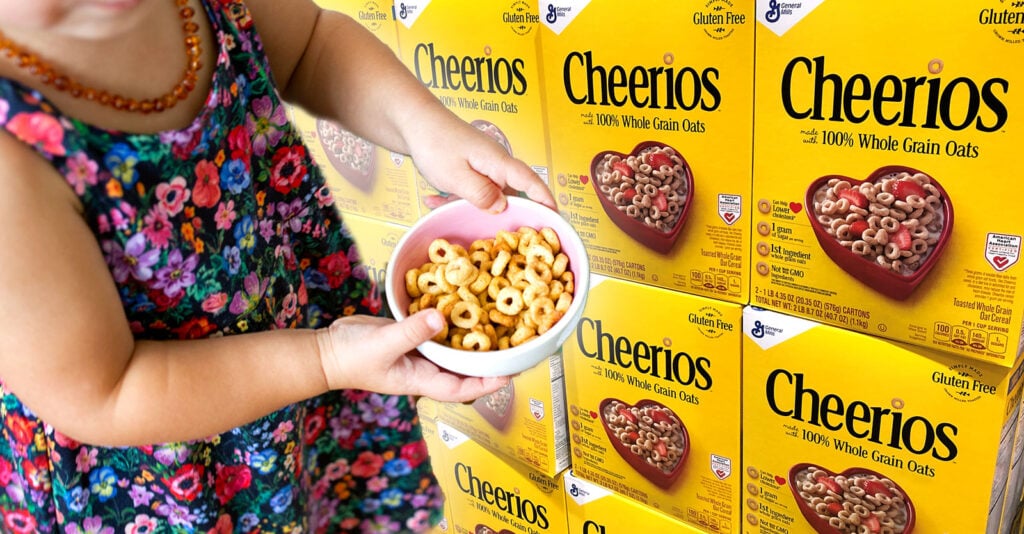85 Popular Grocery Items Contained Phthalates, Study Finds

Nearly 100 popular U.S. supermarket foods and fast foods contain harmful levels of plastic chemicals, according to a recent study by the nonprofit advocacy group Consumer Reports (CR).
The group tested 85 food items and found phthalates — a “plasticizer” used to make plastic more flexible and durable — in all but one of the samples. Phthalates are known endocrine disruptors that can negatively affect pregnancy and child growth and development outcomes.
Nearly 80% of the samples also contained bisphenol A (BPA) — a chemical linked to declining sperm counts, cancers, and metabolic and immune disorders — and other bisphenols.
Foods tested included General Mills Original Cheerios, Trader Joe’s Ground Pork, Applegate Naturals Oven Roasted Turkey Breast, Hunt’s Tomato Sauce and baby foods made by Gerber, Similac, Beech-Nut and Happy Baby.
CR also tested 18 items sold by fast food chains, 10 popular dairy products, nine beverages, seven prepared meals, six types of canned seafood, four kinds of canned beans and three condiments.
“The CR research makes clear that FDA [U.S. Food and Drug Administration] has not been doing its job to protect the public from dangerous plastics in our food,” said Jaydee Hanson, policy director for the Center for Food Safety (CFS).
Hanson told The Defender the FDA should ban plastic chemicals like phthalates and bisphenols from food production. CR agrees and is calling on regulators to take action.
CR noted that the bisphenol levels discovered in its recent study were lower than the last time the group tested foods for the chemical in 2009, suggesting “that we are at least moving in the right direction on bisphenols,” said James E. Rogers, Ph.D., CR director of Food Safety Research and Testing.
But the group found it “particularly concerning” that high levels of phthalates were in so many products — and at higher levels than the bisphenols.
Organic items also had phthalates
Phthalates weren’t found in just one packaging type or just one food type, making it tricky to pin down the point of contamination. CR noted:
“Early efforts to limit exposure to [phthalates] focused on packaging, but it’s now clear that phthalates in particular can also get in from the plastic in the tubing, conveyor belts, and gloves used during food processing, and can even enter directly into meat and produce via contaminated water and soil.”
Chicken of the Sea — whose canned pink salmon had high levels of phthalates — told CR it requires its suppliers to certify they have not intentionally added BPA or phthalates to its products, but the company acknowledged that fish live in water that is often polluted with phthalates.
Other products sold at supermarkets with high levels of phthalates included Del Monte Sliced Peaches, Fairlife Core Power Chocolate High Protein Milkshake and Yoplait Original French Vanilla Low Fat Yogurt.
Items sold by fast food chains had high levels, too, such as Wendy’s Crispy Chicken Nuggets, a Chipotle Chicken Burrito and a Burger King Whopper with Cheese.
Organic products were “just as problematic,” CR said. “In fact, the highest phthalate levels we found were in a can of Annie’s Organic Cheesy Ravioli.”
Meanwhile, some products — such as Pizza Hut’s Original Cheese Pan Pizza — had much lower levels, suggesting to Rogers that “there are ways to reduce how much is in our foods.”
Hanson said three agencies need to take action to adequately address the issue: The FDA needs to ban the use of plastic chemicals in food and food production, the U.S. Department of Agriculture needs to ban them from organic food and food production and the U.S. Environmental Protection Agency needs to ban them from water.
Foods didn’t exceed FDA limits
None of the foods tested exceeded levels allowed by the FDA — but that isn’t saying much since the FDA only has limits for BPA and a few phthalates, CR noted.
Del Monte, Gerber, and McDonald’s told CR that they abided by existing regulations. Annie’s, Burger King, Fairlife, Little Caesars, Moe’s Southwest Grill, Wendy’s and Yoplait did not respond to CR’s requests for comment.
Tunde Akinleye, the scientist who oversaw the testing, said, “Many of these thresholds do not reflect the most current scientific knowledge.”
Even minor disruptions in hormone levels can lead to an increased risk of many health problems, including diabetes, cardiovascular disease, cancer, birth defects, premature birth, obesity, neurodevelopmental disorders, and infertility, CR pointed out.
FDA still refuses to ban plastic chemicals in food production
Eight years ago, groups including CFS sent legal petitions to the FDA asking it to ban plastic chemicals for food processing and packaging. The FDA refused to respond until CFS and Earthjustice in 2021 sued the agency for not promptly issuing a decision.
In May 2022, the FDA denied the petitioners’ request and chose to continue allowing phthalates in food packaging and processing materials, saying it needed more information before it would move to ban the chemicals.
The move drew criticism from Kristina Sinclair, an associate attorney at CFS, who said the FDA had “failed the public” and ignored the “growing evidence” of phthalates’ harmful health effects.
“The agency’s refusal to listen to the science and ban phthalates from our food supply will have significant, detrimental health effects on women, children, and other vulnerable populations for years to come,” Sinclair said.
Hanson said CFS and other groups in 2022 filed new legal petitions to get the FDA to take action, but so far they haven’t received a positive response. “We hope the new food safety head at FDA Jim Jones will respond to our request to him to act promptly.”
The Defender asked the FDA to comment on CR’s findings, but the agency did not respond by our publication deadline.
You can return to the main Market News page, or press the Back button on your browser.

